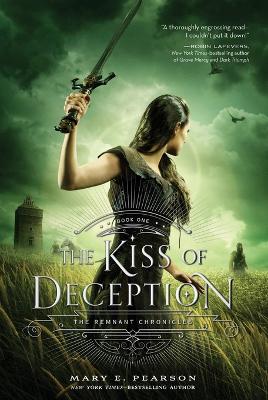Reviewed by Briana @ Pages Unbound on
I am always on the lookout for a great new YA fantasy, and The Kiss of Deception caught my eye with its promise of mystery and magic (and its cover because, really, that is a great play on the “pretty dress” cover—still pretty, but a little more understated, or more boho, than the ball gowns we typically see). Unfortunately, no part of the story lived up to my hopes. Instead of adventure, I found a silly protagonist, a rambling plot, and a lifeless romance. If I had not received this book through Netgalley, and thus felt some obligation to finish and review it, I would have had no regrets in putting it down.
The story opens with Princess Lia preparing for—but then fleeing—an arranged marriage. It is a spunky move, and though her plan does not seem particularly well-thought out beyond “grab a horse and head in the direction of my servant’s former home,” it is exciting. And it brings respect. A lot of readers can get on board with a heroine who says no to people attempting to control her life. Unfortunately, this is basically the last admirable (if we can call running away “admirable”) action Lia takes.
Lia seems to think herself immensely clever, but fails to make any decisions that support her opinion. Although Lia is now supposed to be incognito, she spends a surprising amount of her time discussing her former life in public (where she can be, and is, repeatedly overheard). She also has a penchant for activities and clothing that exhibit the wedding kavah on her back, which clearly brands her as the runaway princess. By the end of the book, I was still uncertain if I was supposed to recognize that Lia only mistakenly thinks she is street savvy because she was so privileged and sheltered, or if I was supposed to buy into the idea and believe her intelligent myself. Either way, I found Lia foolish and therefore had difficulty becoming invested in her adventures. Her indiscretion does allow for some forward movement of the plot, but she could have carelessly revealed her secret far fewer times and had similar results.
The romance (and love interests) did not do much more to capture my attention. In the first place, I spent half of the book confused as to which guy was the prince and which was the assassin. (I admit, however, that was probably my own fault for not reading more carefully and likely had nothing to do with the writing of the book.) Both seem to have good qualities—despite the fact that one is an assassin, of course—but I never personally favored either one or felt that the chemistry between them and Lia was real. Her choice of one man seems arbitrary, beyond its having obvious plot benefits. I do not recall Lia giving a particularly insightful explanation of her decision herself, beyond her sense that one man is hiding something of a troubled personality. More personal scenes leading up to, and clarifying, her choice would be welcome.
The history and religion that background the novel are similarly flat. They, and the magic intertwined with them, suffer from a lack of clear explanation, and ultimately do more to clutter than the book than to add to it. Excerpts from an ancient mystical book are interspersed with the main narrative, and I admit to skimming them because they never seemed particularly interesting or important. Also, the author seems to purposely withold information (like what being a First Daughter even means) as a cheap way to build suspense.
The Kiss of Deception has some good ideas, but they need to be more fully fleshed out. The author should work on world-building, on clarifying her fictional religions and histories and working them more seamlessly into the text. Politics can also be expounded upon, as readers receive only hints as to the turmoil and intrigue that Lia’s disappearance prompt and are not treated to complexities. Finally, the characters in The Kiss of Deception are almost uniformly flat and rely on the author’s telling the readers they possess certain traits—because their own actions and dialogue often fail to demonstrate those traits. Unfortunately, this is an unremarkable book.
Reading updates
- Started reading
- 1 April, 2014: Finished reading
- 1 April, 2014: Reviewed
